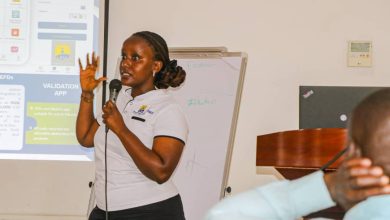HIS EXCELENCE YOWERI KAGUTA MUSEVENI NAMED CHAMPION FOR THE AFRICAN SOCIETY FOR LABARATORY MEDICINE .
the African Society for Laboratory Medicine (ASLM) champion for improving health laboratory services in Africa.
Museveni Honoured for leadership in advancing health laboratory services in Africa
On the 5th of November 2024 at the ASLM-LABDF Convection in Abidjan, Ivory Cost, an award was presented recognizing Uganda’s significant contributions to the Laboratory and diagnostic improvements in Africa.
His excellence Yoweri Kaguta Museveni , the president of the republic f Uganda has been has been named the African Society for Laboratory Medicine (ASLM) champion for improving health laboratory services in Africa.
Receiving the award on behalf of President Museveni, Dr. Diana Atwine, the Permanent Secretary for the Ministry of Health, delivered his acceptance speech, in which the president highlighted the essential role of diagnostic testing in healthcare.
Citing World Health Organization data that 70% of health decisions are based on lab results, the president emphasized the importance of accurate diagnosis to ensure effective disease treatment.
“If the diagnosis is wrong, the prescription cannot be right,” he stated, underscoring the need for strong diagnostic capacity to combat diseases effectively.
Reflecting on medical history, he referenced Louis Pasteur’s groundbreaking discovery of bacteria, noting how scientific advancements have shaped disease prevention and treatment. The president also shared a personal anecdote of how learning about Pasteur’s work led him to caution the Banyankore people against drinking un boiled milk .
The president also applauded ASLM’s efforts to promote Pan-African collaboration in laboratory services and urged African governments to support local production of vaccines, medicines, and lab supplies, citing the risks of relying on foreign sources for health resources.
He stressed that increasing Africa’s pandemic preparedness would not only improve health resilience but also promote economic growth. Uganda has implemented numerous health initiatives to expand access to diagnostics and preventive care, including immunization against HPV for cervical cancer and efforts to improve water safety to combat cholera.
Uganda’s health laboratory services have become a regional model, with the Supra-National Tuberculosis Reference Laboratory supporting upper Sub-Saharan Africa and assisting 23 countries under the Global Fund’s ECSA Health Community’s International Laboratory Systems Strengthening Project.
Museveni concluded by expressing gratitude to ASLM and health workers across Africa, reaffirming Uganda’s commitment to advancing healthcare on the continent and sharing its expertise with other nations.
At the same event ,Dr. Atwine advocated for Africa-wide digitalization of laboratory systems and centralized data management to improve diagnostics across the continent.
Her remarks underscored the importance of integrated digital systems to address common health challenges, enhance pandemic readiness, and boost health outcomes across Africa.
Highlighting the convention’s theme, “Transforming Diagnostic Systems in Africa: Harnessing Innovation and Quality Assurance to Elevate Equity and Excellence,”
Dr. Atwine noted Uganda’s alignment with the goal of universal access to quality, affordable healthcare.
She pointed out that Africa bears 25% of the global health burden yet receives just 1% of the world’s health budget and only 3% of its health workforce.
“This convention helps us re-focus on prioritizing the centrality of the health laboratory sector in delivering quality healthcare,” she said, stressing the need for evidence-based treatments, effective disease outbreak management, and a robust foundation in health research.
Dr. Atwine advocated for adopting emerging technologies, continuous professional training for lab scientists, and increased research investment.
A key objective Dr. Atwine proposed was a “practical way forward” for digitalizing laboratories and creating a centralized data management system for Africa.
Such digitalization, she explained, would interconnect labs across the continent, enable a shared database, and leverage artificial intelligence for research, facilitating advancements in disease treatment and vaccine development for illnesses prevalent in Africa, especially those originating in the Congo and Equatorial basins.
Uganda, which has profiled viruses of global health significance like Sudan virus, Zika, and HIV/AIDS, expressed readiness to share this data with other African nations.
Dr. Atwine urged African governments to accelerate digitalization efforts, emphasizing that a shared database could streamline research, prevent duplicative studies, and enable Africa to tackle its health challenges collectively.
Dr. Atwine called on governments to elevate laboratory departments within health ministries, advocating for labs to become fully recognized directorates.
She offered Uganda’s experience with laboratory governance reforms as a model for other African nations seeking to enhance their health policies.




